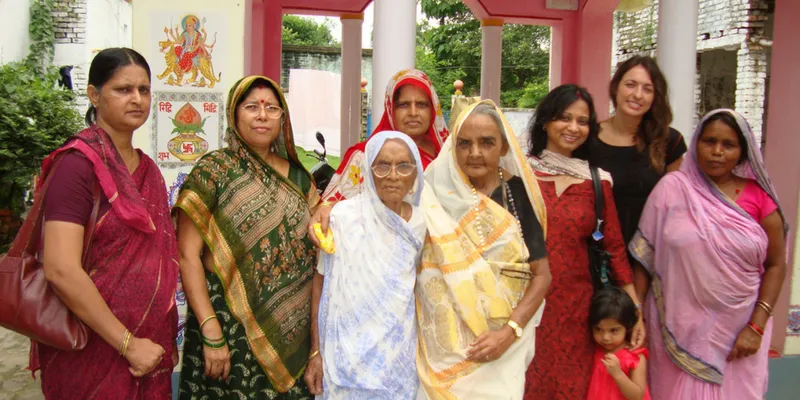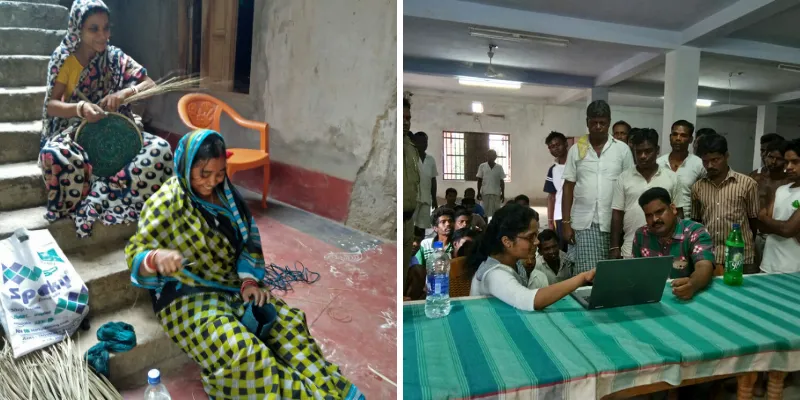This Diwali, empower artisans by gifting your loved ones handicrafts and hand-woven clothes
This festival season, don’t go for the factory-made, mass-produced designs that every other person is sporting. Instead, stand out by gifting handicrafts to support artisans who create unique designs.

The artisan industry is the second largest employer in developing nations after agriculture and largely employs women. India accounts for seven million artisans as per official reports, while people within the industry say the number is almost 200 million. Census data suggests there are roughly 68.86 lakh artisans in India, of which 55 percent are women.
Yet, India contributes a meagre two percent to the global handicrafts industry, while China stands at 30 percent.
The Handicrafts Board of India, in an assessment, stated that apart from being an unorganised sector, artisans face other challenges such as low capital, poor exposure to new technologies, the absence of market intelligence, and - most importantly - a poor institutional framework.
Research studies suggest the number of Indian artisans has been rapidly decreasing, indicating the urgent need to reinvest in India’s artisans to safeguard history and promote culture as an important source of livelihood.
Several startups have realised this and are helping revive the industry by equipping artisans with the latest trends and the demands in markets through various skill-based training while connecting them with consumers through e-commerce platforms. We draw up a list of some of them.
1. MITHILAsmita
With an aim to support women and the art in Madhubani, the native art form from Mithila in Bihar, which dates to the 14th century, Ihitashri Shandilya founded MITHILAsmita, which translates to ‘The Pride of Mithila’.

Practitioners of this art form, Ihitashri says, face umpteen challenges, including lack of availability of art history education, lack of proper marketing of these art forms, and low remuneration and recognition of artistes.
MITHILAsmita has undertaken numerous activities to address these pain points: ArtnHer: An initiative to showcase art and art merchandise handcrafted by rural women artists and World of Madhubani (WOM): A not-just-for-profit sustainability initiative to showcase the authentic heritage of Madhubani art to the world, as well as museum partnerships where paintings are exhibited in metro cities like Mumbai and Bengaluru, among others.
The revenue generated, with the sale of any product, is shared with rural artisans directly.
2. Lal10
Maneet Gohil’s love for travelling and interacting with people led him to co-found ‘Lal10’, an ecommerce portal for niche handloom, handicraft and indigenous food products from different states and regions of our country.

Lal10 bridges the gap between the rural artisan and the urban customer. Lal10 has a student community that researches products and reaches out to vendors across various regions. This is how their inventory continues to grow. The students also take photographs and video interviews of artisans that are put on social media for marketing.
A group of student employees from NIFT bring in the design aesthetic and make products look even better on the portal. Sourcing is generally managed by their student community, which is spread across the country, the artisans and their logistics partners.
3. Cotton Fabs
In order to revive hand block printing and handloom, support and train more artisans, and in turn empower women, Aarti and Rohit Rusia founded ASHA (Aid and Survival of Handicrafts Artisans) in Chhindwara district, Madhya Pradesh.

ASHA, sold under the brand name Cotton Fabs, is a one-stop destination for both manufacturing and sales of hand block printed fabrics and designs. All the work – from the production unit in Chhindwara district to the hand-woven fabrics – is done by women. ASHA has made a conscious effort to provide employment primarily to rural tribal women of Madhya Pradesh. The team has also made efforts to train women in this art form and empowered them to work from home as well.
Following the motto “Art–Artist–Customer,” the startup has been successful in eliminating the middleman from the system. Cotton Fabs deals directly with the consumers, thereby enabling a large part of the profits going directly to the families of rural artisans. Currently, ASHA provides employment to 30 people.
4. KalaGhar
Ecommerce platform KalaGhar works with artisans to adapt to trends and helps them find a market for their beautiful, timeless products. Founded by two sisters, Shipra and Megha Agarwal, the Odisha-based startup hope to revive the handicraft industry of Odisha, Chhattisgarh and West Bengal with new product ideas and designs.

Focusing on dhokra and organic sabai (dried fibre) grass products, the startup primarily works with artisans from Dhenkanal, Baripada and Baliapal in Odisha. Through research and quality control, they are bringing in standardisation in the handicrafts section and reducing the payment gateway to a week, by connecting with consumers through their ecommerce portal.
KalaGhar is working hard to revive the Indus Valley civilisation art form of dhokra for mass appeal and usage through decorative pen stands, earrings, wall decor, bracelets and other jewellery.
The sisters took their commitment to the cause to another level by collaborating with Baripada jail in Mayurbhanj district, and conducted a seven-day workshop on Sabai weaving for the prisoners there. At present, they are working with 25 artisans and aim to add 25 more by 2020.
5. SouvNear
Founded in 2013 by Harvinder Mavi, along with Gurmeet Walia, and Jagdeep Pannu, the B2B startup buys products from artisans and exports them to buyers in over 14 countries. Working with over 10,000 artisans from across India, the social enterprise supports independent artisans as well as those associated with manufacturers and NGOs.

SouvNear does not market its products heavily and most of their onsite traffic is organic. About 60-70 percent of the orders are repeat orders with the bulk coming from countries such as the US and the UK. Since it is a fragmented market in terms of demand, its target audience consists of small- and medium-sized stores, wholesalers, and retailers.
The startup partners with independent designers who assist the artisans by giving them raw designs, thereby modifying traditional craft to meet contemporary demand.







